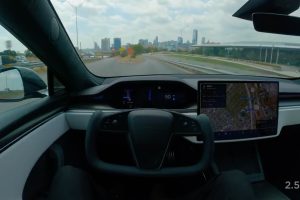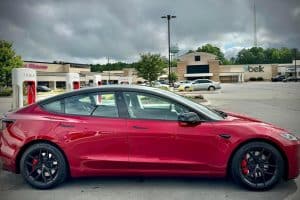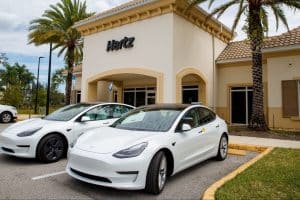A potential fleet of Tesla Police Cruisers was rejected by Spokane, Washington’s Police Department after an evaluation of the all-electric Model Y crossover did not convince some members that the vehicle would be effective for law enforcement. Despite several stories of success from Police Departments across the country and even internationally, Spokane’s Police Department brought plenty of concerns to the table.
However, when Spokane officers got their hands on the Model Y, they were not convinced of what they saw.
“They’re not a suitable police car. They are too small. They are not designed for police work,” Maj. Michael McNab said in a Spokane City Council meeting in late February. The Spokane Department was set to receive one Model Y crossover in early 2021 after it set aside time for determining infrastructure concerns like charging and receiving enough funding for the project.
The synopsis of electric vehicles as police cruisers from the Department’s Major McNab seems to put the Spokane Police in a bit of an awkward situation. While the Department and local political leaders are interested in adding at least two electric vehicles to their fleet this year, Teslas seemed to fall short in their reviews of the vehicle. In total, the Spokane PD will buy 64 new vehicles this year, hoping to eventually transition to less combustion engine vehicles and more electric ones. However, another manufacturer will likely be producing the EV police cruisers.
It is not all bad, and there are plenty of options moving forward. Luckily, the EV sector is not confined to a few options like it was several years ago. In 2018, mass-market and affordable EVs were few and far between: the Chevrolet Bolt EV was the United States’ most-popular electric car. That is, until Tesla ramped Model 3 production that year, basically catalyzing the rest of the automotive industry to get moving on plans for electrified options.
Now in 2022, there are several vehicles on the market that offer sustainability and the necessities for a police cruiser. While the Model 3, Model Y, and Model S from Tesla have all made their ways into law enforcement agencies across the country, the Mustang Mach-E from Ford is also being considered by several departments, including one in Michigan and another in Europe.
Spokane City Council President Breean Beggs told the Department that other options are available, but it is imperative the Department moves toward electric options as State and City laws require the transition “whenever feasible,” according to the Spokane Review (via Police1).
“If the Tesla isn’t the one you want, pick some you would like and try them out,” Beggs said during the City Council meeting. EVs are a focus of Beggs, who suggested other electric options, like Ford’s upcoming F-150 Lightning pickup. “Things continue to evolve. There’s better and better options,” Beggs said.
Officers are stating that they are not fully convinced of the availability and “readiness” of EVs, and are leaning more toward the Ford K8 Hybrid SUV. Fully electric options are not considered suitable by the officers, who believe the cars were geared with traditional passengers in mind. Employees were surveyed to determine their thoughts on the Model Y as a cruiser, which brought back plenty of concerns regarding space. With the needs of a Police Officer taking up some of the cargo space of the vehicle, it could be a tighter fit than other vehicles.
However, so many departments have credited switching to EVs as a catalyst for economic savings and on-job advantages. The Westport Police Department in Connecticut showed massive financial savings during its first years with a Model 3 police cruiser. The Department also credited the vehicle’s lack of engine noise and quick acceleration as perks when performing police duties.
Maj. McNab seems unconvinced of the advantages. “For this 64-vehicle purchase, there isn’t a suitable electric vehicle solution, and if we were to buy any one of these alternatives we would just be experimenting with electric cars on a grander scale than we are with the two Teslas,” McNab said. Beggs believes the Department should be asking “How” EVs could work, instead of simply dismissing the idea altogether. “That’s my frustration with the Department,” Beggs said.





